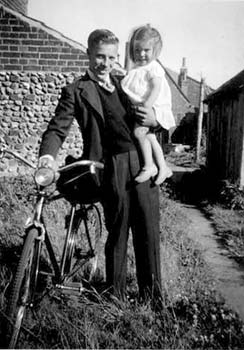
| Itteringham.com |
Families & People
|
||||||||||||||||||||||
If sufficient material is available a whole page can be devoted to a family. |
||||||||||||||||||||||
|
In 1881 Joseph Fiddy, a widowed labourer, aged 81 from Itteringham was residing in Aylsham Union Workhouse. Amongst the other inmates were 8 persons registered as imbeciles. |
Mary Ann Bartram married Edmund/Edward Heazel in 1832 in Itteringham. Edward / Edmund Heazel / Hazel left $100 (U.S.) to Richard Bartram "stepson" in his will (1877 Huron County, MI, USA). The inheritance was signed for by William Bartram of Itteringham. Edmund/Edward Heazel is said to have run away from home when he was a child. His parents caught up with him when he was about 10 or 12 and asked to him come home. He refused. |
Itteringham hurch records show that a Nathaniel Hancock married a Mary Bird 17/11/1772. They had at least 8 children, all christened at Itteringham: William 1773, Mary 1776, Benjamin 1778, Robert 1779, James 1782, John 1784 – John 1875, Elizabeth 1787. Robert born 1779 married Elizabeth Reynolds 29/12/1807 and they had at least 7 children christened at Itteringham: Jane 1816, William 1819, John 1821, James 1823, Frances 1825, Martha 1827, Robert Nathaniel 1832. Robert Nathaniel married Jane and they had at least 8 children christened at Itteringham: Jane 1859, Benjamin 1862, Susan 1868, Robert 1869, Martha 1872, John + William 1874, Hannah 1877 and Frances 1879. The churchyard survey shows a clear photo of Robert Nathaniel Handcock’s gravestone. Sheila Harkin - 30th March 2008 |
 |
|
Dereck
Broughton & Shirley Hunt c.1949
|
My Uncle Dereck Broughton with my sister. No. 3 can be seen in the background We moved to No. 3 Big Yard when my father came out of the RAF Norman Hunt - 11th December 2004 |
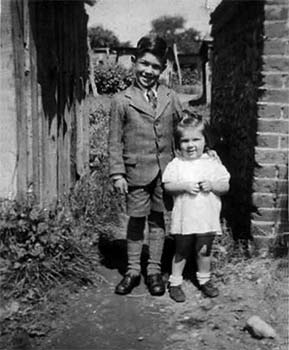 |
|
Norman
& Shirley Hunt c.1949
|
Me and my sister Shirley at No. 4 Big Yard Norman Hunt - 11th December 2004 |
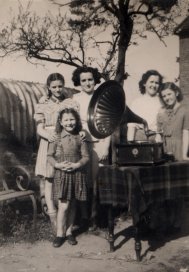 |
Prior and Hall families at Robin Farm for Mary Prior's birthday party in the late 1940s Mary Prior (back left) Nancy Prior (back centre) Peggy Prior (back right) Janet Hall (front left) Mary Hall (front right) |
I have spoken to my parents and they said my grandparents were at Mosseymere from the early 30's (my father said he was about 12 at the time) until about 1950 when my grandparents moved to the Common. My grandfather Sidney Jickells was head keeper on the Wolterton estate but I believe the shoot was not actually run by the then Lord Walpole - I may be wrong. My parents met on the Wolterton estate when my father after leaving school went as underkeeper and my mother was in service in Wolterton Hall. I seem to remember her saying that on occasions she helped to look after Robin (now Lord Walpole) when he was small.
Linda Young (nee Jickells) - 14th November 2006
|
I am a descendant of Charles Garnham (Itteringham, 1845). His wife, Sarah Garnham (née Pratt) travelled to Australia with her children - her grave stone carries the inscription "Native of Norfolk, England" Sarah married Charles, her farmhand after her first husband. John Pratt (her first cousin) died after being thrown from a horse. John was Sarah's first cousin and was a A Yeoman Calvary Officer of the Manor House Itteringham. His father's name was Christian. Sarah brought to Australia her four Garnham children and four Pratt children in 1853 after Charles died. Geoff McKeown, Sydney, Australia - 4th January 2005 |
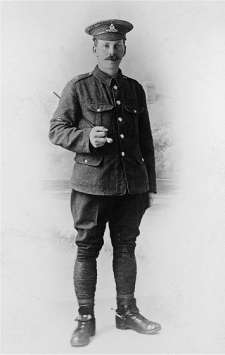 |
|
Wheeler
G.W. Yaxley, Ammunition Column, Royal Field Artilliary, WW1
|
George Hawkins, farmer at Bintry Farm had a son George and a daughter Dora, who married Charles Gay on 16th April 1914 (see Bridge_page). Charles Gay was the father of Charles Gay who farmed at Hall Farm, Mannington for many years before moving to Blickling. When Dora's father George became old he moved in with his daughter and husband at Hall Farm. A Mr Barker, who was the foreman for Charles Gay moved into Bintry farmhouse. |
My parents Ernest and Lilian Dale were relatively new comers to the village, taking up residence as licensees of the Walpole Arms in 1931. I have a record of licensees from 1836 which could be of interest to include in the history of this village. Ernest and Lilian Dale had six children, Doris, Ralph, Stanley, Leonard (Nobby), Bevra and George. I have photographs of my family during their period of residence in the Walpole Arms. I also have photographs of Mr. (Ted) Prior delivering milk and lived in the farm house behind the old mill with his family during the renovations to the mill which was then taken over by the airforce during the war for the officers based at Matlaske aerodrome. Mr and Mrs Prior had 6 children, 3 sons and 3 daughters. Arthur, Richard, Peter, Nancy, Peggy and Mary. Ted Prior was well known for herding his cows in for milking, he could be heard just about all over the village. I also have a photograph of George Marsh who was the village postman and he lodged at the Walpole Arms with the Dales for a number of years. Bevra Menlove - 8th August 2011 |
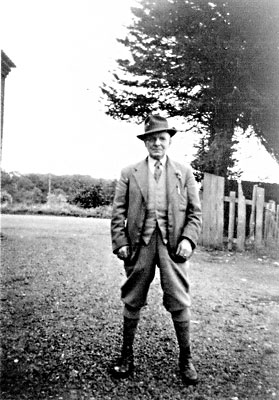 |
|
Postman George Marsh lodging at the Walpole Arms 1955 |
Both my parents Ernest and Lilian Dale were Norfolk people, my father originated from the Norwich area and my mother from Northrepps. Her maiden name, Reynolds. They met and married before the 1st World War, when dad was in the army and mum was cook to Lady Hoare. Just after they were married dad was sent overseas and my sister born just after he left. After the war they settled down in Bintry and dad took up farm labouring with a man by the name of Prince. (I never knew his given name). Prince lived with us from then on, he was like a part of our family. My 3 brothers, Ralph, Stanley and Leonard (Nobby),who I will now refer to as Nobby, because Leonard, nobody would know who I was talking about. He acquired this nickname when a toddler when somebody said, what a knobby little fella he is, from then on this is the name he was known by, were born in Bintry as I was. I was 1 year old when dad took over the licensee of the Walpole Arms in 1931 George was born in 1937. The beer came in wooden barrels and laid on its side on wooden frames. Served by a tap straight from the barrels. The cellar 2 steps down from the bar in the next room it was a quite a few steps to serve customers. The till a small wooden box with dividers. The safe, a straw bag tucked under the mattress of mum and dads bed. All very primitive The beer was supplied by Bullards of Norwich and the soft drinks from Pinchens of Corpusty. There is on record Mr Dale being fined a shilling in 1934 for allowing gaming on the premises. This “Gaming” consisted of paying a penny for guessing the number of pips in a pumpkin. The proceeds to help fund a dinner put on by mum and dad for their regulars, held in the big club room upstairs, that ran the whole length at the front of the house. This was also a lovely play room for the Dale children and all their friends. We did have a gramophone that wound up with a handle. When the spring broke we would twist yards of string around the spindle, one of the boys would then race up the other end of the room pulling the string to turn the turntable, playing a record. Not very successful but a lot of fun. In the winter some of the locals preferred their beer hot. This was done with a large cone shape metal container, with long handle to hold,filled with a pint of draught beer then placed in the big coal fire. This was also a favourite with the Dale children when we had a cold but for us a spoon of sugar would be added. There was no sewerage system or mains running water. Drinking water etc was drawn from a pump across the yard. There were 6 big outhouses, 2 for pig styes, and 2 for storage such as gardening tools, bicycles, meal and corn for the pigs, chickens, turkeys, geese, ducks and goats. When dad wanted to breed with the pigs he and my brothers would walk the sow to Mr. Seamans farm in Wolterton who had a male. From the very beginning this home was never a one family home. Mum and dad were always fostering children. People working in the area at various times, for instance lumber jacks during the logging season who would arrive at only a few hours notice, wanting accommodation from Monday to Friday for at least 2 – 3 weeks My mothers day started at around 5 a.m. until at least 11 p.m. The flag stone floor of the public bar was scrubbed every morning on hands and knees. Mum and dad could not afford to employ staff so everything in the house was done by mum. All the cleaning, cooking, washing etc. Baking day was Friday from early morning to late in the afternoon, using the big wall oven in the kitchen. Mum was a wonderful cook. Christmas time mum always had to make at least 6 big Christmas puddings, these were always cooked in the big copper that mum used to boil the clothes in. When these were served on Christmas Day, mum would slide a silver threepenny piece under each slice. We pretended we didn't notice and acted so surprised when we found it. These were given back to mum to buy a bottle of lemonade. I still have some of these coins. Because we were always such a big family, Sunday lunch, our main meal would have to wait until the bar closed at 2.00 p.m. We would all then queue with plates, knives and forks in hand and mum would serve up the roast dinner from the big kitchen table as we all filed by. From there we all retired to the public bar where there were 2 long tables to be seated. The rest of the week we all ate at different times. There was approximately 2 – 3 acres of garden which my father cultivated with every known vegetable plus rows of strawberry beds, gooseberries and rhubard. Planting all done by hand except for the ploughing which he employed the next door farmer to do. Also there was a large orchard with numerous types of apple trees. Dad had regular customers for his vegetables in the Mile Cross area of Norwich, where he made deliveries twice a week, his transport a car with a trailer attached. The tropical fruit bought from a supplier. After the Dales left, this land was taken over by the Fowels and incorporated in their farm, but not for vegetables. From the 30's we always had a car. The first a rather large Citroen with various other makes to follow. The Citroen had a rack on the back where my dad fitted a wooden box for the purpose of transporting potatoes. This box came in very handy sometimes on a Sunday when dad piled about 12 – 13 children in the back of the car but usually there were some left over so 2 and sometimes 3 boys would sit in the box, we always took some of the children from the village with us and off we would go for a trip to Cromer. Dad was in the RAC so always got a salute from the mobile RAC mechanic who traveled the roads on a motor bike and sidecar. Mum and dad annually organized a day trip for the regular customers. One being a coach ride to Coltishall and from there a river trip to Yarmouth. Mum and dad always supplied the food and drinks which they would take with them. The draught beer in I believe big stone flagons and possibly a couple of crates of bottled ale or such. Each man had a button hole from the Passion flower that grew on the climber just outside the kitchen door. One year the river Bure froze over and when the thaw set in, great lumps of ice would float downstream. The boys, including my brothers would jump from the bank on to a floating block of ice, unfortunately Francis Titchely (Driddle) as he was known landed too heavy and his foot went through, consequently a wet foot. The pub kitchen was always a great place for us to congregate in bad weather and this was a perfect occasion to play cards while Driddles sock dried hanging on the door of the big range fire. Sometime later, the smell of burning wool brought to their attention, one burnt sock minus foot. On Guy Fawkes night we had the biggest of bonfires built in the sand pit and for weeks all the kids would collect anything that burnt. The evening of the 5 th Nov. was a community affair, all bringing their fire works to enjoy the occasion. All the Dale children attended the Methodist Sunday School where Mr. And Mrs. Hannant were the Ministers. Before each Harvest Festival the children would call on every household in the village collecting home grown fruit, vegetables and preserves to decorate the chapel. The river Bure was regularly cleared of reeds carried out by Lou Regis in a flat bottom boat. His area reached from Itteringham to Blickling Mill. I was rather disappointed when returning to Itteringham in 1976 to see that reeds had completely covered the river. There were beautiful trout and eels in the river but you had to have a licence to fish.This did not deter Nobby, mum only had to mention she would love a trout for her Sunday breakfast and Nobby would be up at the crack of dawn, to the river, standing in the water with both hands under the bank. When he felt a nice fish he would gently rub its underside and suddenly with both hands the fish would land on the bank. No rod or line involved. One morning he was caught by the game warden, which normally would have involved a large fine but on this occasion he asked Nobby to give him a couple of fish, but there was no way Nobby was going to agree. So the warden offered to pay which was O.K., because what he offered was nearly as much as Nobby earned in wages. Mum did still get her trout for breakfast. Aylsham would hold a fancy dress parade each year and mum entered Ralph and Nobby as cowboys. They had a small cart, covered like a covered wagon with a donkey in the harness. Ralph lead the donkey while Nobby sat inside the wagon playing cowboy songs on his mouth organ. Unfortunately right in the middle of the parade the donkey refused to move but eventually Ralph got it going again. I think they won a prize but I could be wrong. During the 2nd World War there was a lot more activity in the village. Mainly due to all the service personnel stationed in the area. There was the Matlaske fighter drome one side and Oulton bomber drome in the opposite direction. As stated earlier the officers from Matlaske were billetted at the newly renovated mill. The officers at Oulton based at Blickling Hall. A number of evacuees from London were sent to country areas to escape the bombing and Itteringham had their share.Mum billeted 3 boys, but the evacuees did not stay until the end of the war. After they left 3 families arrived on the doorstep in the early hours of one morning.Relatives we had never met also from London escaping the blitz They did stay for quite some time. It was then the club room as such was partitioned off to make 3 more bedrooms to accommodate all the visitors. Dad, along with my brothers dug a big pit to serve as an air raid shelter. Fortunately we did not have to use it because at the first down pour of rain it filled with water. Anyway, we only had 2 bombs dropped and they were on one of Archie Wrights fields and killed a rabbit. The worst experience were having to test the gas masks we were all supplied with and the van that was filled with tear gas came to the village. A number of children at a time were told to enter and walk around in the van but the problem was when you came out and took of the mask the gas was still on the clothes so many sore and watery eyes. Dad worked on the Matlaske aerodrome. My brother told me dad had a little van taking round tea to the workers. I guess you could say, the first mobile tea lady. He also worked at the cooks quarters at Blickling Hall I believe keeping the boilers working. There were mainly WAAFS whose quarters were built just inside the gates of Blickling woods. The girls didn't believe that Ernie had a pub so one evening they decided to check it out. They became regular customers. It was then my brother Ralph met his wife Betty and Stanley his wife Pat. Both Ralph and Stanley were in the navy at this time. Nobby later joined the Marines. He married my girl friend Joyce. All their babies were born at the Walpole Arms. There are so many stories to be told about this small village and the people, who were all great characters in their own right. I have only covered a verysmall part. There were the Titchellys, who lived in the semi detached council house opposite the rectory, the Wells family next door. The detached Police Station next door, Constable Fiddy in residence.The Broughtons,, Barrets, Whites, Peckhams, Skinners, Fairheads,Grand and Wrights, Halls and many others. On the common, the Thompsons, Lambournes (Magistrate), Reynolds, Aytons, Fowels, Amiss, in particular Bob who I never saw wearing a coat, even in winter. He would only wear a jacket,unbuttoned, possibly didn't have one and his collarless shirt unbuttoned to the waist. His brother Pick, (never did know his Christian name), Ernie and Annie. Harry Broughton who had the little shop on the common. He was the local supplier of pig meal, corn etc., and flour served straight from the sack into brown paper bags. He made his deliveries by horse and cart.Ted Prior who served the milk straight from the churn with a metal measuring container with handle to hook on to the rim of the churn. No bottles or cartons those days. Medoe, the story goes acquired this nickname when he was a very young boy and instead of saying “me go, me go” he couldn't sound the ‘g's. All these people would have their own story to tell and it would be nice to know if there are people in the area age group of 70's, 80's and 90's that we knew and they remembered us. George and I (Bevra) were the only members of the family that moved away from Norfolk. George to the London area when he joined the Metropolitan Police and there he met his wife Joan. Myself to Bedfordshire where my husband Alan came from ( I met him when he was stationed at Wolterton Park) Ralph and Betty now live in Marsham, Stanley and Pat in Aylsham where Stanley has his barber shop, but has now handed over to his son James. I do believe that Stanley still gives a few haircuts. Nobby and Joyce in Great Ryburgh. Ernie and Lilian Dale are buried side by side in Itteringham church yard along with grandfather Dale. Bevra Menlove née Dale, Melbourne, Australia - 24th August 2011 |
If you have any memories, anecdotes or photos please let us know and we may be able to use them to update the site. By all means telephone 07836 675369 or
|
Copyright © Jonathan Neville 2004 |